| Srl | Item |
| 1 |
ID:
074946
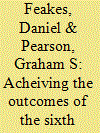

|
|
|
| 2 |
ID:
154710
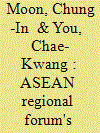

|
|
|
|
|
| Summary/Abstract |
The Association of Southeast Asian Nations Regional Forum has introduced the Experts and Eminent Persons system as a security affairs–related epistemic community in Asia Pacific. However, its performance has remained rather stagnant. This article assesses its performance by examining achievements and limitations of the system and identifies barriers to its effective functioning. The findings attribute its dismal performance to skewed composition and poor quality of membership, lack of depth and diversity of expertise and knowledge, absence of knowledge sharing or diffusion function, and negligible policy impact. The article suggests ways to improve the performance of the ARF-EEPs, and concludes by offering theoretical, empirical, and policy implications.
|
|
|
|
|
|
|
|
|
|
|
|
|
|
|
|
| 3 |
ID:
147840
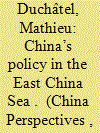

|
|
|
|
|
| Summary/Abstract |
This paper looks back at China’s policy towards the establishment of a crisis management mechanism with Japan in the East China Sea from the beginning of the negotiations in 2008 to the deadlock reached at the end of 2015. During this period of seven years, China moved from being a reluctant negotiator to interrupting the negotiations and finally accepting their resumption, but only after setting such a high bar in terms of relative sovereignty gains that the talks unravelled. The paper argues that the socialisation of China to confidence-building norms in the security sphere – norms that the strategic community of the PRC traditionally rejects – is making very slow progress despite the rising risk of incidents in maritime East Asia. It concludes that Chinese foreign policy uses crisis management negotiations to secure a variety of foreign policy goals linked to sovereignty and balance of power rather than a tool purely dedicated to building security and stability by freezing an existing status quo.
|
|
|
|
|
|
|
|
|
|
|
|
|
|
|
|
| 4 |
ID:
072976
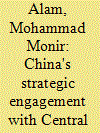

|
|
|
| 5 |
ID:
003029
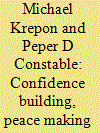

|
|
|
|
|
| Publication |
Henry L Stimson Centre, 1992.
|
| Description |
18p.
|
|
|
|
|
|
|
|
|
|
|
|
Copies: C:1/I:0,R:0,Q:0
Circulation
| Accession# | Call# | Current Location | Status | Policy | Location |
| 034630 | 327.172/KRE 034630 | Main | Withdrawn | General | |
|
|
|
|
| 6 |
ID:
074945
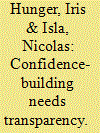

|
|
|
| 7 |
ID:
152071
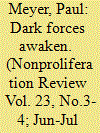

|
|
|
|
|
| Summary/Abstract |
International cooperation on outer-space security has fluctuated over the past decades, marked by periods of common endeavor and relative stability as well as times of destabilizing developments and rising tensions. A high-water mark of space-security diplomacy was the 2013 UN Group of Governmental Experts consensus report on “Transparency and Confidence-Building Measures in Outer Space Activities,” which set out a rich menu of measures and promised new levels of cooperative security among states. Regrettably, the report was followed by a series of negative developments that threaten to reverse the cooperative trend it espoused. These developments include the introduction (by Russia and China) and rejection (by the United States) of a revised draft treaty on the Prevention of Placement of Weapons in Outer Space (PPWT); the adoption by the UN General Assembly of a divisive resolution on “no first placement” of space weapons; the failure of the European Union to gain support for its proposed Code of Conduct, as well as escalating strategic tensions. This viewpoint analyzes the re-emergence of these “dark forces” and their implications for multilateral diplomacy and makes suggestions for remedial action to preserve outer-space security.
|
|
|
|
|
|
|
|
|
|
|
|
|
|
|
|
| 8 |
ID:
181691
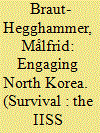

|
|
|
|
|
| Summary/Abstract |
North Korea and the United States are edging towards re-engagement. They agree in principle on pursuing a phased approach to negotiations but disagree on how to begin and what the end goal should be. A warming-up phase can allow states to informally explore specific options for future engagement. By participating in activities such as table-top exercises, simulations and familiarisation visits, the participants develop a more specific understanding of the purpose and format of the activities and verification measures that might follow a formal agreement. This process engages the technical and military bureaucracies at an early stage. It provides a private setting to raise concerns and address misunderstandings. It is an opportunity to demonstrate goodwill and interest in engagement that does not require concessions. Drawing on past examples, this article suggests specific options for a warming-up phase involving North Korea and the United States.
|
|
|
|
|
|
|
|
|
|
|
|
|
|
|
|
| 9 |
ID:
073540
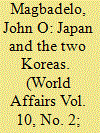

|
|
|
|
|
| Publication |
2006.
|
| Summary/Abstract |
The millenary relations between Korea and Japan have been intense, fruitful and conflictive. They are now largely determined, in the wider regional context, by the evolving power equation between China, Russia and the USA whose rivalries resulted in the division of Korea into two inimical states. John O Magbadelo argues that both Japan and China are interested in the stability of the Korean peninsula on the basis of the status quo.
|
|
|
|
|
|
|
|
|
|
|
|
|
|
|
|
| 10 |
ID:
055277
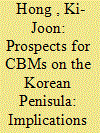

|
|
|
| 11 |
ID:
006748
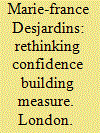

|
|
|
|
|
| Publication |
London, Oxford Univ. Pr., 1996.
|
| Description |
71p.
|
| Series |
IISS, Adelphi Paper.307
|
| Standard Number |
0-19-829321-6
|
|
|
|
|
|
|
|
|
|
|
|
Copies: C:1/I:0,R:0,Q:0
Circulation
| Accession# | Call# | Current Location | Status | Policy | Location |
| 038541 | R 355.03/DES 038541 | Main | On Shelf | General | |
|
|
|
|
| 12 |
ID:
072869
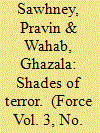

|
|
|